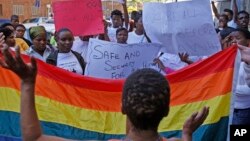A high court in Malawi has ordered the annulment of a government moratorium issued in 2012 that suspended a law criminalizing homosexual acts. The government had suspended enforcement of the anti-gay laws pending parliamentary review after rights campaigners said the laws were unconstitutional.
The court’s order to enforce the anti-gay laws comes two months after government authorities ordered police to respect the moratorium by unconditionally pardoning two suspected gays who were arrested in December last year in the capital, Lilongwe.
Selective enforcement
Three pastors filed suit in the northern city of Mzuzu, saying that by pardoning the gay suspects, the government was applying the penal code selectively. They argued that the government’s suspension of the anti-homosexuality law was illegal.
“Our main arguments have been that the executive branch of government, the minister of justice, the director of public prosecutions and Malawi police service do not have the mandate to change the position of any law in the country,” argued George Kadzipatike, lawyer representing the three pastors.
He said only the Malawi parliament has the mandate to change or suspend any law in the country.
In Malawi, homosexuality is an offense punishable by up to 14 years in prison.
“And having regards to the penal code which prohibits acts of homosexuality in the country, that Act of Parliament was not amended or repealed in any way by the Malawi parliament,” he added. “So it is still in force and has to be applied.”
Court to review sexuality referendum
When announcing the order this week, Judge Dingiswayo Madise said the arrests [of gays] should continue until there is a judicial review of the government’s decision to stop the prosecutions of gay people in Malawi.
Timothy Mtambo, a campaigner for minority rights and also the executive director for the NGO Centre for Human Rights and Rehabilitation, said the court's position on the matter is worrying.
“These laws are archaic and undemocratic and these laws are not supposed to be implemented in the nation that has the human rights regime,” he said.
Mtambo said his organization is ready to support any group that will challenge the high court’s order, which he said will force the country’s more than 40,000 homosexuals to suffer in silence over fear of being arrested.
“When there was a moratorium, you saw a number of members of LGBT [lesbian, gay, bisexual, and transgender] community coming in public, demanding their rights to say, ‘I am a gay and I am demanding my rights.’ So this time around is like we are going back to square zero,” said Mtambo.
A spokesman for the Presbyterian Church in northern Malawi, Reverend Maurice Munthali, welcomes the high court order. “Rights should not be a hiding leaf for people to commit sin. What we think is that anything that is unlawful should not be turned into a [human] right,” he said.
Government authorities said they will announce their position on the court’s order once they go through the court’s documents.




